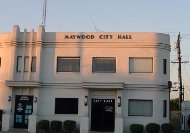7/7/2009
Maywood, California Dumps Red Light CamerasCity council in Maywood, California decides to stop using Redflex to run a red light camera program.

The Maywood, California City Council on Wednesday dumped the Australian company in charge of the city's red light camera program. Since 2004, Redflex Traffic Systems has had the right to issue tickets at the intersection of Slauson and Alamo. The council voted 3-2 not to renew the five-year agreement, against the wishes of city staff who proposed new "cost neutral" contract terms.
"(The) city shall be obligated to pay the cumulative balance invoiced by Redflex, in accordance with terms set forth above, to the extent of gross cash received by the city from automated red light violations," the proposed new contract language stated.
Tying the vendor's compensation to the amount of cash received violates a state law mandating flat-rate contracts for photo enforcement systems. A week before the council's vote, the editor of the Highwayrobbery.net website warned council members that an appellate ruling had already found similar contract language between the city of Fullerton and Nestor Traffic Systems (NTS) was illegal (view opinion). Accepting the new deal with Redflex could put the city at legal risk. In May, the city of Turlock also dumped red light cameras over fears regarding the cost neutrality.
According to the proposed contract language, cost neutrality would not apply "if the signal amber timings at the photo enforced intersections are not set to the minimum requirements of CalTrans in California." In the past, photo ticketing companies prohibited the increasing of yellow warning times to ensure maximum revenue. If strictly interpreted, this provision would have the same effect by imposing a financial penalty if the city chose to extend the duration of yellow times.
A 2004 Texas Transportation Institute study proved that going one-second beyond such bare minimum signal timings yielded a 53 percent reduction in tickets, but more importantly it reduced accidents by 40 percent (view report).


